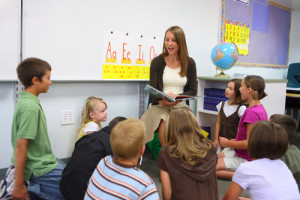The phrase, “Cash is King”, has long held true in more capacities than one. However, this phrase may soon be replaced by a similar phrase dubbing supply and demand as uncontested ruler of all things. “Supply and Demand” refers to a need for a commodity and the need’s relationship to the ongoing supply of it. Typically, supply and demand is most often thought of when buying or selling a physical good. This is not always the case though.
The Age-Old Concept: S & D
Vocational job positions are also quite susceptible to the true king, supply and demand. What line of work may be the best illustration of this? Early elementary, or early education teachers are today’s unfortunate, stand-out example.
The title of the USA Today article, “K-5 Teacher Overload: Too Many Trained, Not Enough Jobs”, says it all. So too do many of the statistics cited by news articles like this one:
– Last year, Illinois trained 10 teachers for every one real position made available.
– In 2010, New York trained more than double the expected needed teaching force for 2011.
– Cherry Hill, N.J elementary schools last year received an average of 400 to 600 applications for every one such teaching position made available.
This is supply and demand.
So what exactly is to blame for such a modern-day imbalance in the early education workforce? Like so many other institutional hiccups these days, a struggling economy is the root cause of the ailment. First, there is a large and growing population with an associated percentage striving for a limited number of teaching careers. The limited number of these careers is due to a number of present factors: state budget rollbacks, long-time teachers putting off retirement, non-tenured position eliminations. In addition, it has come to light that many colleges and universities do not actively look into or provide information as to the vocational supply and demand outlooks for teacher positions.
Futures
On the note of this popular non-disclosure of teacher job-outlooks, here is some helpful and current information. Math, science, and special education have been so-far immune to the supply and demand imbalance. This is largely thought to be due to the extra educational requirements for specializing in these disciplines.
Also, there are great regional disparities that can be capitalized upon. For example, according to a recent Bloomberg Businessweek news article, despite the overall overabundance of teachers to positions, California is one such state where the inverse is the case. States like California are cited to be greatly short of educators when future enrollment projections are tallied.
In conclusion, supply and demand proves its place yet again. If there is a morsel to be learned here, it is a great one for those who are pursuing their careers and choosing the educational paths necessary to do so. Look into the outlook futures of your intended career choice before finding out later when it’s too late. In doing so, whether you are pursuing a career in teaching or any other vocation, you have paid your just dues to the all-mighty ruler of all – supply and demand.
 Follow
Follow
 Being a teacher means being a part of shaping humanity’s tomorrow. Such are careers of truly greater callings. But to be a good teacher, one must stay active in the pursuit of excellence. In the exact spirit of that pursuit, we review five professional conferences perfect for teachers looking to stay on top of their game.
Being a teacher means being a part of shaping humanity’s tomorrow. Such are careers of truly greater callings. But to be a good teacher, one must stay active in the pursuit of excellence. In the exact spirit of that pursuit, we review five professional conferences perfect for teachers looking to stay on top of their game. Teachers and educators always have plenty to keep their minds occupied. But if you are a teacher who is now ready to conclude your meritorious career, you may be thinking a lot about retirement plans and your future. If you have supplemental income needs or are simply not ready for the idea of full-time retirement, you are not alone. This is actually quite normal. The great news though is that there are plenty of vocational ventures that you can seek out to make this transition more ideal to your specific needs, and here we provide five suggestions to make sure you stay busy in your retirement.
Teachers and educators always have plenty to keep their minds occupied. But if you are a teacher who is now ready to conclude your meritorious career, you may be thinking a lot about retirement plans and your future. If you have supplemental income needs or are simply not ready for the idea of full-time retirement, you are not alone. This is actually quite normal. The great news though is that there are plenty of vocational ventures that you can seek out to make this transition more ideal to your specific needs, and here we provide five suggestions to make sure you stay busy in your retirement. The 29th annual MetLife Survey of the American Teacher has released some harrowing news. All across the country, the satisfaction and job security experienced by teachers has taken a nosedive. In fact, the level of overall job satisfaction has dropped to the
The 29th annual MetLife Survey of the American Teacher has released some harrowing news. All across the country, the satisfaction and job security experienced by teachers has taken a nosedive. In fact, the level of overall job satisfaction has dropped to the